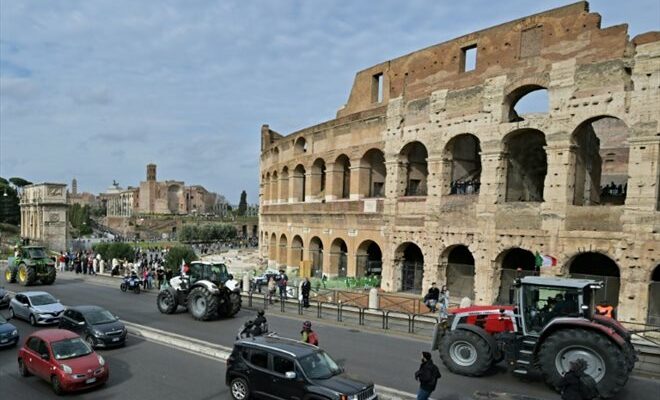A police officer walks near tractors blocking the A6 motorway, February 1, 2024 near Chilly-Mazarin in Essonne (AFP/EMMANUEL DUNAND)
Brussels on Tuesday adopted a partial exemption for 2024 from fallow obligations, a key demand of recent agricultural protests, as sector organizations maintain pressure on governments across the EU.
This was a new feature of the new Common Agricultural Policy (CAP): to receive aid, farmers must respect environmental criteria, in particular leaving at least 4% of arable land fallow or non-productive areas (hedges, groves, ponds). …).
The European Commission had completely suspended this condition in 2023 to produce more and compensate for the disruptions in Ukrainian and Russian cereal supplies following the invasion of Ukraine. And a majority of member states, including France, vigorously pleaded to renew this exemption.
Under pressure after weeks of strong agricultural demonstrations, where the question of fallow land was a scarecrow, Brussels finally proposed a “partial exemption” at the end of January.
Cost of fertilizers and energy, impact of Ukrainian imports, “extreme climatic episodes”… “Farmers are having difficulty respecting” the fallow obligation, otherwise at the risk of a “significant impact on their income” and “endanger their viability”, recognizes the Commission.
According to the decision published Tuesday, farmers will be able to receive aid if they reach at least 4% by adding not only any fallows and non-productive areas but also intermediate or nitrogen-fixing crops (lentils, peas, etc.) without use of phytosanitary products.
A relaxation valid only this year, specifies the regulation published in the Official Journal of the EU.
Farmers will be “subject to fewer restrictions on the way they use arable land, this will limit income losses, while guaranteeing certain environmental benefits”, since the practices listed support “soil health and biodiversity” while by fixing nitrogen and carbon, believes Brussels.
– “Flexibilities” –
A decision adopted despite the reluctance of part of the Twenty-Seven, unable to achieve a qualified majority to approve the text during a vote on Friday.
At issue: Brussels had initially proposed a threshold of 7% at the end of January instead of the 4% finally adopted. “This modification follows negotiations with the States, the logic being to offer more flexibilities,” admitted a Commission spokesperson.
But this reduction irritated Germany, which denounced the imbalance to the detriment of the protection of biodiversity and abstained. Italy voted against it, along with three other countries.
In the absence of approval from the Member States, the Commission retained the possibility of deciding alone.
However, if this exemption was loudly demanded by the agricultural world, many of their other demands remain unresolved.
-“Administrative burden”-
The FNSEA, the main French agricultural union, warned on Tuesday that farmers were ready to relaunch their vast mobilization if the concrete measures expected from the government were not there “within ten days”.

Farmers on board their tractors in front of the Colosseum, February 9, 2024 in Rome (AFP/Andreas SOLARO)
Same pressure in Greece, where the Prime Minister met angry farmers in the morning, and in Belgium, where hundreds of tractors rolled Tuesday morning towards the port of Antwerp with a view to organizing filter dams, according to local media.
In Italy, hundreds of tractors massed last week on the outskirts of Rome, pushing Italian Prime Minister Giorgia Meloni to restore tax exemptions for low-income farmers in an attempt to defuse anger.
The Commission is trying to offer additional guarantees: at the end of January, it assured that “the conditions were not met” to conclude the criticized trade agreement with the South American Mercosur countries, and proposed measures to limit imports Ukrainians.
A sensitive subject: the dumping of Ukrainian grain on the road by Polish farmers at the border on Sunday caused a new crisis between Warsaw and kyiv.
Above all, Brussels promised a rapid proposal to “reduce the administrative burden” weighing on farms, before other measures following a “strategic dialogue” initiated with the sector.
The European executive is eagerly awaited: French President Emmanuel Macron called at the beginning of February for “tangible” simplifications of the CAP and a special health force to “avoid” “unfair competition” within the EU resulting from an application disparate rules by Member States.
© 2024 AFP
Did you like this article ? Share it with your friends using the buttons below.




